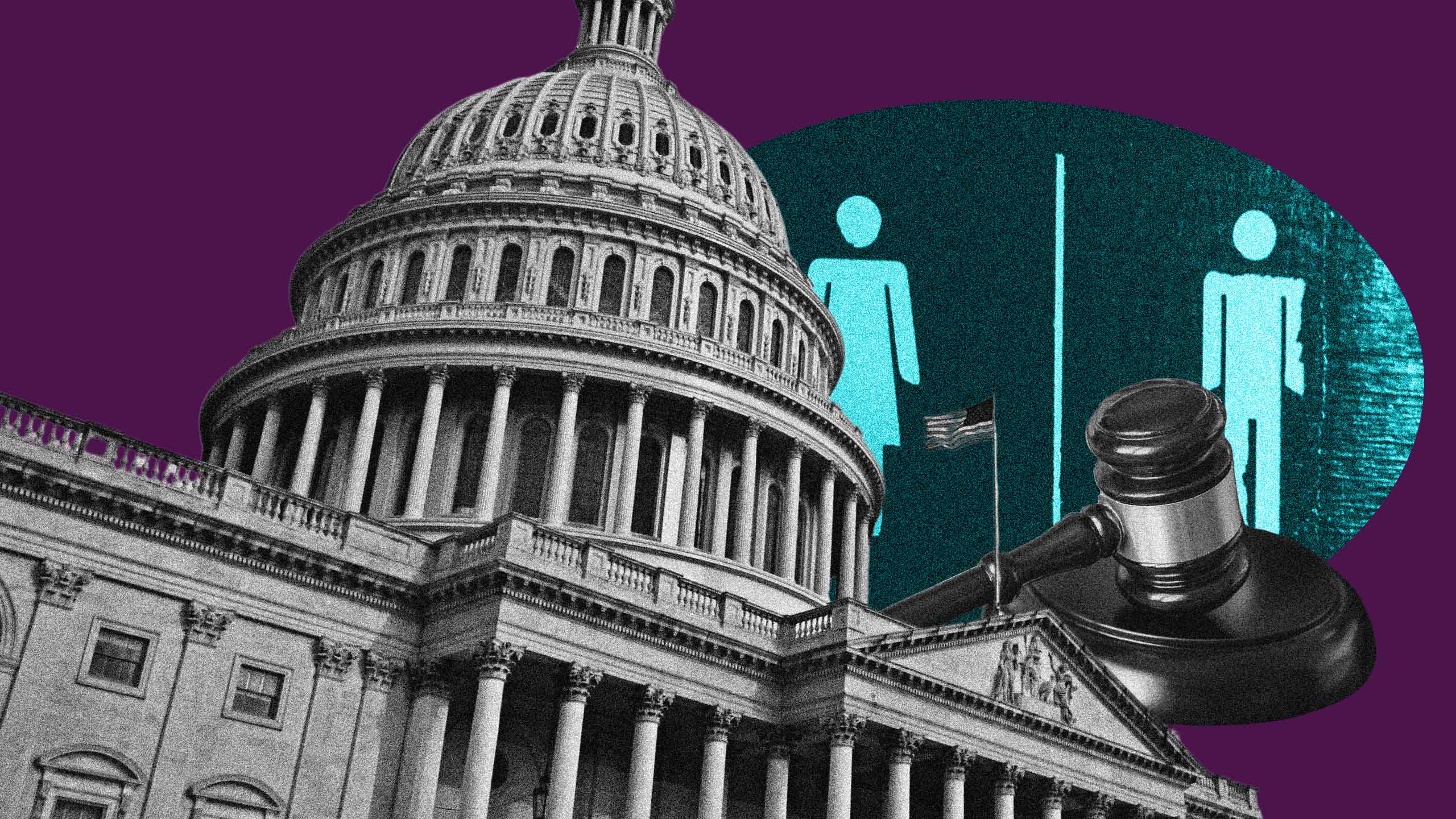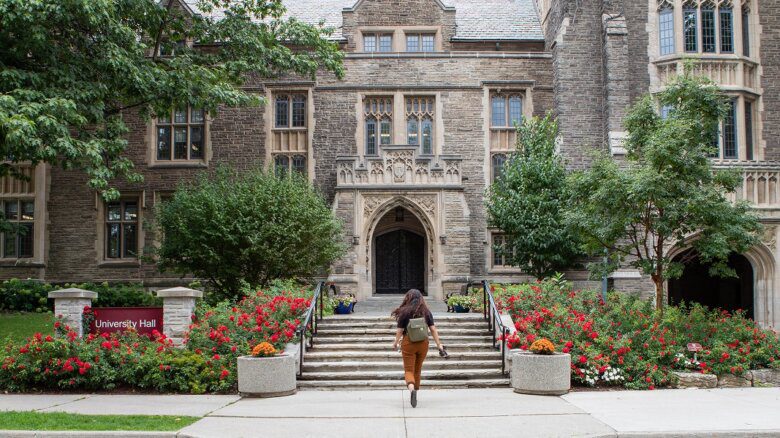Jay Saper was one of 15 people arrested at the U.S. Capitol Building in December for protesting a bathroom ban targeting trans people. But for Saper, the sit-in was about more than facility access. “Politicians have regarded trans people as disposable,” Saper tells Xtra, “and when that happens, they can advance a broader set of policies that completely eliminate everything that we have fought for.”
Saper is an organizer with Gender Liberation Movement, the grassroots activist collective that led the demonstration against the Congressional bathroom regulations. Just days before activists occupied the restroom closest to the office of House Speaker Mike Johnson (R-La.), Congresswoman Nancy Mace (R-S.C.) authored a resolution targeting her freshman House colleague, Rep. Sarah McBride (D-Del.), the first out trans woman ever elected to the federal legislature. The proposed rule, which was swiftly adopted, forces all visitors to the U.S. House of Representatives to use the bathroom, locker room and changing area that corresponds with their “biological sex,” including members of Congress themselves.
The fight in Congress would preface a renewed fight across the U.S. over where trans people should use the bathroom. Although the concept of the bathroom ban was once thought to be dead following the defeat of North Carolina’s infamous HB 2, which was repealed in 2017 following threats of a billion-dollar corporate boycott, the legislation has surged eight years later. Just two months into the new year, 44 bills seeking to limit the bathrooms that trans people are permitted to use have been introduced in U.S. state legislatures, according to Trans Legislation Tracker. That’s the largest number of any year in history, as well as a 52 percent increase over 2024.
Saper, a longtime activist and organizer, says these bills are little more than a pretext for dehumanization: a way for politicians to see just how far the public will go in stripping away the rights of trans people to exist. “They’re all hinged on the same belief: that trans people’s humanity does not need to be respected and that we are a people with no dignity,” they say. “We are continuing to fight for the dignity that all trans people deserve because fighting for trans liberation is life-saving. We’re never going to stop fighting for one another.”
The bathroom bills being debated by state lawmakers in 2025 are even more extreme than those that have been introduced in previous years. Prior to the current legislative session, 15 states already had laws on the books targeting trans restroom access, and the majority of bills single out K-12 schools, according to the Movement Advancement Project. Just two states levy criminal penalties against violators: Florida and Utah, which are coincidentally the only jurisdictions with bathroom bans applying to all government buildings. (Florida’s law classifies the offence as a first-degree misdemeanour, punishable by up to a year in prison and a $1,000 fine.)
But emboldened by U.S. president Donald Trump’s win in the 2024 election, Republicans have further upped the ante. A bathroom ban swiftly making its way through South Dakota’s legislature this year would effectively force incarcerated trans people into solitary confinement in order to comply with the regulations. Across the border in North Dakota, lawmakers are attempting to ban schools from having single-occupancy bathrooms, with heavy fines threatened against campuses that do not comply. The scope of Montana’s bill, which has already passed both houses of the legislature, loosely pertains to all “public buildings,” defined as auditoriums, dormitories, hospitals, museums, libraries and university structures.
Andy Nelson, executive director of the Western Montana LGBTQ+ Community Center, predicted that the state’s Republican governor, Greg Gianforte, would sign the bathroom ban into law. This is despite the fact that the legislation is all but unenforceable. “We can’t have people standing in front of every bathroom checking people’s genitalia,” he says. “That’s impossible. It’s created a problem that doesn’t exist, and it’s not making restrooms any safer for women and children.”
But despite the logistical issues with the legislation, Montana’s bathroom ban has received virtually no opposition from state Republicans. Every GOP lawmaker voted in favour of the bill, and Nelson predicts there are many more anti-LGBTQ2S+ proposals to come. He says that he’s seen more bills targeting the trans community in 2025 than any year previous. “I’m not even up to speed on them all,” Nelson remarks. “They are literally trying to eradicate our existence.”
Even state legislatures that aren’t traditionally breeding grounds for anti-trans policy have seen unprecedented traction this year in scapegoating trans bathroom use. Although Wyoming is one of the reddest areas of the entire country, voting for Trump by the largest margin of any state in 2024, the state traditionally has a libertarian streak on social issues. Over the past five decades, Wyoming Equality executive director Sara Burlingame says that lawmakers who introduced anti-LGBTQ2S+ legislation “would be defeated every single time from a dominant supermajority of Republicans.” Historically, that hands-off approach cut both ways: Wyoming is one of just four U.S. states without a hate crime law on the books, 26 years after the anti-gay murder of Matthew Shepard, who was attacked outside of Laramie, made international headlines.
But even in the allegedly live-and-let-live Wyoming, things have shifted dramatically in a short time. This year, a minimum of 17 anti-trans bills have been introduced to its legislature, as opposed to just two back in 2022. At least two of 2025’s proposals are bathroom bans: one would apply broadly to government-owned buildings, including schools and prisons, and the other threatens campuses with loss of accreditation if they allow trans students to use the restroom that is most appropriate for them.
Burlingame says the introduction of these kinds of proposals has caused many of her colleagues and community members to flee Wyoming, feeling as if it’s no longer a place they recognize as their home. Those leaving the state include progressives and conservatives alike, she stresses. “The shift that we’re seeing is big government, alt-right Republicans who are happy to give executive power to legislate families and their healthcare and their education decisions,” Burlingame says. “That’s a new thing for us. They have radically changed the shape of Wyoming politics for the worse and for the craven.”
While it’s unclear how many of this year’s proposed bathroom bans will become law, the Trump administration has wasted no time enacting its own internal policy. Just weeks after the House implemented its controversial regulations on trans restroom use, Trump’s Office of Personnel Management ordered all federal government agencies to block their trans employees from using gender-congruent bathroom facilities. The directive was part of a wider purge of diversity, equity and inclusion (DEI) initiatives from the White House, including the erasure of LGBTQ2S+ content from federal websites. (The deletion of references to the trans community from the National Park Service web page on the Stonewall National Monument drew fierce backlash and public protest, given the central role trans activists played in the early queer rights movement.)
In returning to the cultural hysteria of the HB 2 era, LGBTQ2S+ advocates say there’s a reason that Republicans are now circling back to the bathroom issue. Cathryn Oakley, senior director of legal policy at the Human Rights Campaign, says that it’s extremely difficult for trans people “to be able to participate in basic life functions” if they can’t use the bathroom safely: What if they are called for jury duty or if they have to defend themselves in court? Those kinds of questions, she adds, make it “really, really hard to figure out how you’re supposed to exist in any of these places.”
What bathroom bills do, Oakley says, is shift the Overton window of discrimination: moving it further and further until Republicans have convinced the public at large that trans people ultimately have no place in society. “That’s the argument that our opponents are trying to use: ‘We had a lot of success convincing folks to be afraid of trans girls playing sports. What if we now also tried to convince people that they need to be afraid of trans girls using the restroom? And if they’re afraid of trans girls using the restroom, should they be afraid of trans girls being able to get jobs?’” she says. “They’re just pushing the envelope as far as they can.”


 Why you can trust Xtra
Why you can trust Xtra


